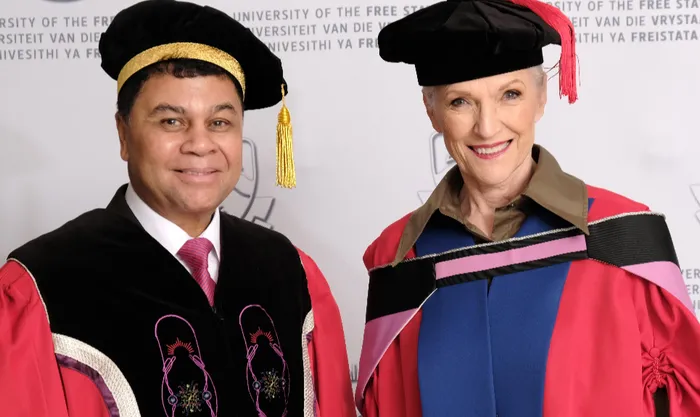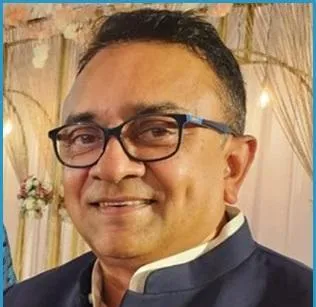Honorary doctorates: a double-edged sword for academia
Prestige or peril?

Professor Francis Petersen, Rector and Vice-Chancellor of the University of the Free State (UFS), and Dr Maye Musk, recipient of an honorary doctorate in Dietetics, after the graduation ceremony.
Image: https://www.ufs.ac.za/File picture
HONOURARY degrees, though intended to recognise exceptional contributions, have become a source of controversy. This issue recently resurfaced in South Africa when Professor Mary Metcalfe, an academic and politician, raised concerns about the awarding of honorary doctorates, particularly when there's a transactional element involved.
A prominent example is the honorary doctorate in dietetics awarded to Maye Musk, Elon Musk's mother, by the University of Free State (UFS). This was a first for the university in that specific field. Shortly after receiving the degree, Maye Musk provided two scholarships, each valued at $15 000 annually, to two full-time UFS students.
While the UFS defended its decision in 2023 by stating that Musk had significantly contributed to dietetics, questions have arisen about whether the doctorate was a precursor to expected donations from the mother of "the world’s richest man".
Given that this is not an isolated incident of a doctorate being awarded under questionable circumstances, the Council for Higher Education (CHE) released a report in June 2025 titled "Good Practice on the Awarding of Honorary Degrees and Professorships". This guide clarifies that honorary doctorates are globally bestowed upon individuals recognised for "exceptional contributions to knowledge, the university or society in general, and academic scholarship or research," and recipients do not need to meet "normal academic requirements".
They are often awarded for significant voluntary contributions to social upliftment in areas like social welfare and human rights, or to cultural icons whose contributions to music and arts improve the human condition.
The CHE guide explicitly states that only public universities in South Africa can confer honorary doctorates. It also stipulates that these degrees should not be given to university staff, students, council members, or politicians, and, importantly, that "no financial contribution should be attached to the awards".
It's worth noting that, contrary to popular belief, there are no private universities in South Africa. A significant concern highlighted is the awarding of "honorary doctorates" by institutions not authorised to offer any qualifications, such as the "Trinity International Bible University," which has been identified as granting unaccredited degrees to South African celebrities.
Titles hold prestige, cultural capital, and generate respect in society due to the perception of authority associated with them. This is especially true in hierarchical societies where status is based on both ascribed (example, race) and achieved (example, a doctoral degree) criteria.
A standard doctoral degree signifies years of rigorous study, research, and the presentation of a thesis that makes a new, peer-assessed contribution to a field, thus extending scientific boundaries. Therefore, it's understandable that some in the academic community believe a proliferation of honorary degrees can, to some extent, undermine the value of their scientific work.
The situation worsens when honorary awardees engage in behaviour or make public statements that contradict the fundamental values of democracy, ethics, and freedoms enshrined in the South African Constitution. Maye Musk, for instance, has been a controversial figure. She encouraged voter fraud during the 2024 US presidential election, suggesting people could "have 10 fake names, go to 10 polling booths and vote 10 times" and falsely claiming it was "not illegal".
This post received over 2.5 million views and severe backlash, leading to tags for the FBI and FEC due to concerns about promoting illegal activity. The post was subsequently flagged with a community note clarifying the illegality and providing links to the US election code. Maye Musk later retracted her statement.
She was also involved in another public incident where she allegedly made a racially insensitive remark in a now-deleted post on X, commenting that an Asian-American reporter writing a book about Elon Musk "is sadly a Vietnamese-American". Such public statements can bring the awarding universities into disrepute.
In response to such issues, the Council on Higher Education (CHE) in South Africa explicitly recommends revoking honorary degrees if recipients are guilty of criminal misconduct or unethical behaviour, or if they express unacceptable social or political views according to the awarding institution's principles.
A notable South African example of an honorary doctorate being revoked for post-award disreputable actions is that of convicted murderer Oscar Pistorius. Internationally, Aung San Suu Kyi, the Burmese politician and Nobel Peace Prize laureate, had ten doctorates revoked from various countries for allegedly supporting the ethnic cleansing of the Rohingya minority.
While honorary degrees are intended to acknowledge exceptional contributions, their potential misuse poses a threat to academic credibility. Recipients are permitted to use their titles when communicating with the awarding universities or within a university setting. However, they are prohibited from using the title in daily life and in all general communication, and on CVs it must be explicitly stated that the degree was honorary and listed under "Awards and Honours" rather than "Educational Qualifications".
The sheer volume of documented cases detailing fake degrees and misrepresentation points to a systemic vulnerability in the public perception and regulation of academic titles in South Africa. This is not merely about a few individuals falling into disrepute after receiving a legitimate honorary degree; it encompasses a broader erosion of public trust caused by widespread fraudulent claims and unaccredited awards.

Professor Dasarath Chetty
Image: File
Professor Dasarath Chetty currently serves as a Visiting Professor in Germany, India and Malaysia.
** The views expressed do not necessarily reflect the views of IOL or Independent Media.
Related Topics: